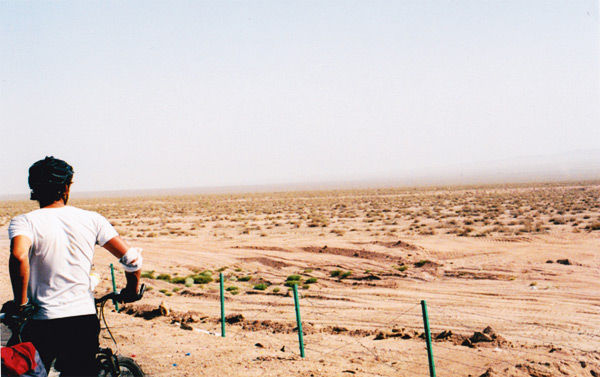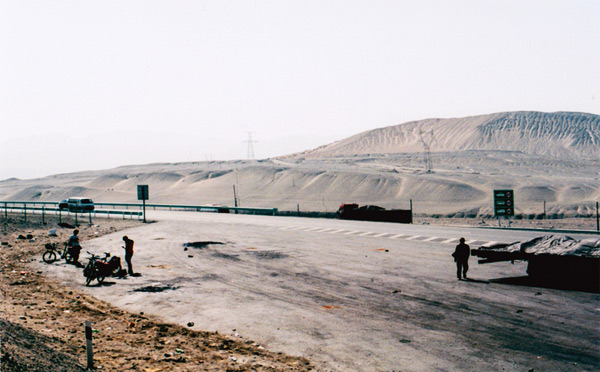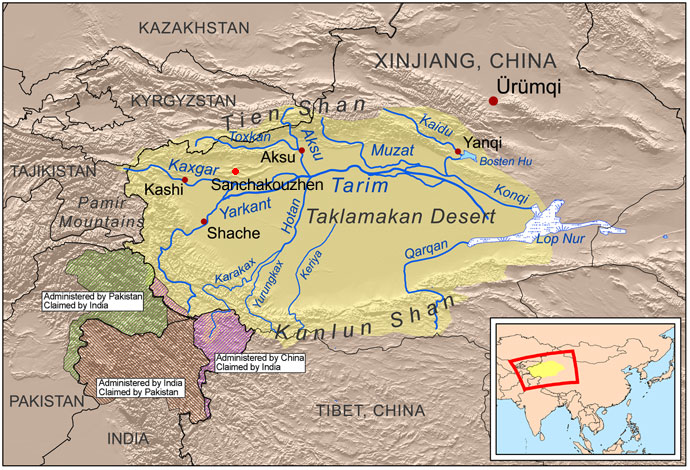Joyriding the Taklamakan
You’re never alone in the desert – by Nikolai Blackie

A few years ago, I found myself in far western Xinjiang province, a small town called Sanchakouzhen, 150 miles east of Kashgar on the old northern Silk Road. It was less a town and more a pit-stop for trucks carrying minerals from the mines in China’s west to the refineries out east. The town was made up mostly of Uighur households, who made a living selling spare tyres and provisions to the passing long-haulers, and two restaurants run by Hui families – the ethnic minority descended from centuries-old intermarriages between Han Chinese and Muslim migrants from along the Silk Road.
I was on a journey with some friends from the UK, cycling along the ancient trading route from Kashgar all the way to Beijing. But three days in, my friends had been struck down by food poisoning from some lamb kebabs the night before and were bedridden. Spared the horrific results of bacteria roulette, this left me with some free time while they recovered in the only hotel in town.
The hotel was a concrete-block-with-beds affair that was set up by a family of Han Chinese, mainly for the truck drivers who were facing, or had faced, the incredibly long trip around the Taklamakan desert, a vast rocky nothingness which takes up most of southern Xinjiang. We noticed that these “traffic” hotels tended to cater only for Han, and very occasionally for anomalous westerners such as ourselves – although sometimes they didn’t carry the required license for hosting foreigners and we would be swiftly moved on by the local constabulary.
By the side of the highway, all the empty cans of energy drinks discarded showed that the road signs – depicting swerving cars and cartoon policeman wagging their fingers – were largely considered decoration. Later on in our trip, I would find that these blue signs were the only part of the landscape that was not a shade of beige. I would also discover that there are many more shades of beige than I thought possible. Apart from other vehicles, the only people we would come across made their living by collecting those empty cans to sell for scrap, sometimes walking for days in the heat and the gritty wind, their bounty slung over their shoulders.

In Sanchakouzhen that morning, I took the only taxi in sight to a slightly larger town a few miles down the road, in search of an internet café. I needed to figure out our route for the coming few days towards the next city of Aksu. These cafés were sometimes called internet cities, owing to the endless rows of computers and armchairs where one can while away the hours playing computer games or chatting online, with pot noodles and cigarettes. In the end it only took me five minutes to plot the route for the next week and a half. It was simple: stay on the only tarmac road. Keep the desert on your right.
When I left the café, the taxi was still in the car park. The driver was a young Uighur man. Either no one needed to get anywhere, or they had been dissuaded by his snoring as he lay on the bonnet. Life in the smaller towns of Xinjiang seemed a good sight more relaxed than in the cities, where we encountered grim-faced armed police staring at the passers-by with suspicion and an edginess that gave you the feeling something had recently happened, or was about to.
Since I had nothing else to do, I decided to flex my language skills and ask him about the area. Luckily he spoke Mandarin with a fairly clear accent – albeit groggily for the first couple of minutes – and we were able to have a decent chat. I learned that he was 23, called Ahmed, and lived just over the road from the hotel where my comrades were enjoying their rest. He was planning to get married next year. No, he didn’t have a girlfriend yet, but he was working on it.
It seemed that Ahmed had nothing to do that day either, so he took me on a trip around town, honking at girls as we passed by, showing off the curiosity in the passenger seat. Afterwards, we drove back to his neighbourhood in Sanchakouzhen, just by the hotel. Once there his best friend, a tyre-seller called Ahmedinejad, got in the taxi with his newborn baby and off we went for a joyride through the desert. Since Ahmed was a taxi driver by trade, and this was technically his time off and not a fare, he asked to swap places and let me drive for a while. I was more than happy to oblige.

Taking the driver’s seat, I drove our rickety Jetta along an unmarked dirt track in a desert landscape not far off a Mad Max film set, with the two young Uighur men and a baby called Mohammed. My new friend Ahmedinejad complained to me about the cheapskate truck drivers who didn’t buy new tyres from him when the treads had gone bald, but would simply carve new ones in with an axle grinder. I got the feeling he had had this particular conversation with new acquaintances many times before.
The two friends chatted in a mix of Uighur and Mandarin, the latter mainly for my benefit, punctuated by an English word here and there such as “Beckham!” or “the Queen!” We took a tour over to the largest rock in sight (about 20 feet high) and climbed to the top to get a view of the area. I got some cuts and bruises along the way, while my companions skipped up easily in their flip flops, Ahmedinejad carrying a three-month-old babe in one hand. From the top we could see the desert stretching away into the horizon to the south, while the small town we had come from was at the base of a range of mountains in the north.
When the sun showed signs of setting and the temperature began to drop, we headed back to Sanchakouzhen. I was invited to Ahmedinejad’s home for dinner, behind a wall of old tyres in a wooden shack. It was a subdued affair, with little talking, but a lot of staring from the rest of the family – four more boys and two small girls – and the neighbours. Westerners simply did not come for dinner in those parts and I was something new to the table.
As soon as I sat down on the carpet-covered floor, I made the mistake that my friends and I would make many times during our trip through Xinjiang. I talked to the women. When I thanked the lady of the house for the meal, there was a strained atmosphere for a short while until she left the room to bring more food. Ahmed gave me a signal by looking at me quickly and silently shaking his head, but his features creased into a smile just as quickly and the tension lifted.
I was saved any further embarrassment when the sun set. There was no electricity in the house and we ate the rest of the meal (rice, lamb and cartons of milk) in the pitch dark. I spent the next part of the evening answering questions that jumped out of the dark at me. Many were about David Beckham – the pinnacle of English PR. Others were more personal: Was I married yet? Why not? Where did I learn my Chinese and what on earth was I doing here? Why didn’t I just take a train to Beijing? That last one was a question I asked myself several times over the coming weeks.
I learned a few essential words in Uighur, but mostly I just ate while everyone discussed me in hushed whispers. Once the dishes were cleared away, I was asked to join in prayers with the men. They were well aware that I wasn’t a Muslim, but they invited me to follow their actions as best as I could in the dark, kneeling and facing the same direction, repeating their Arabic. My butchering of the language was readily forgiven, and afterwards we shared another carton of milk in silence. Finally, I thanked my hosts and called it a night.
Ahmedinejad’s household was an example of a particularly religious and hospitable Uighur family. Later in the Xinjiang stage of the trip, depending on our distance from a city, we would often be met with resentment or distrust – sometimes scarily so. Whether it was a result of oppression by Beijing or simply rural wariness of outsiders, I can’t say. On a few occasions we met Uighur men, young and old, who sold and consumed strong spirits, and once we were circled by some drunk bikers. It turns out Islam in Xinjiang is a wide spectrum.
The day after my dinner with the family, my cycling companions had regained enough strength to continue the trip, and we set off on what would be a gruelling six weeks ride to Beijing. We would encounter many more acts of kindness and hospitality along the way. But for me, none of the people we met would offer so much, while owning so little, as my Uighur friends Ahmed and Ahmedinejad.
•
Nikolai Blackie is from London, but is putting his feet up in Beijing for a bit, writing things
Nikolai and his friends took 45 days to cycle from Kashgar to Beijing, to raise money for the UK MS Society. Photos courtesy of the author, and you can see more of their pics on Flickr here


















